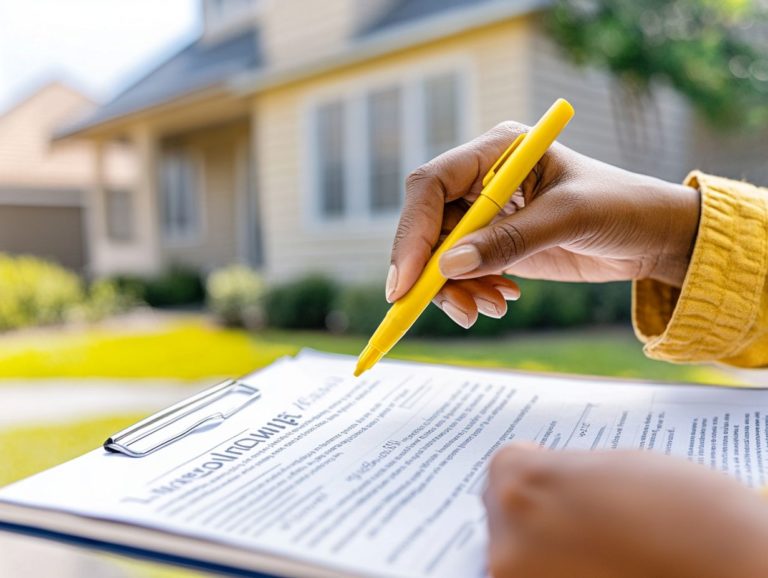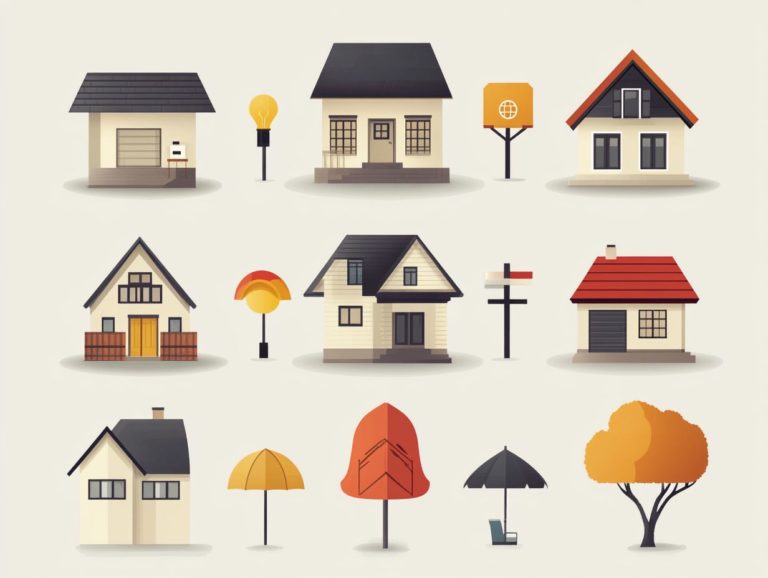How to Handle Home Insurance Rate Increases?
Navigating home insurance can be overwhelming. The details of rates can leave you puzzled.
Many factors influence these costs. You might wonder why rates suddenly increase and how to keep premiums manageable.
This article clarifies home insurance rates. It offers insights into rate fluctuations, ways to counter increases, and tips to lower your premiums.
By the end, you ll be equipped to make informed decisions about your home insurance.
Contents
- Key Takeaways:
- Understanding Home Insurance Rates
- Why Home Insurance Rates Increase
- Dealing with Rate Increases
- Ways to Lower Home Insurance Rates
- Considerations Before Changing Insurers
- Frequently Asked Questions
- What causes home insurance rate increases?
- How often do home insurance rates increase?
- Is it possible to negotiate a lower insurance rate?
- What should I do if my home insurance rate increases?
- Are there any strategies to prevent home insurance rate increases?
- Should I consider switching insurance providers when my rates increase?
Key Takeaways:

- Understand factors that impact home insurance rates, like location and coverage needs.
- Know common reasons for rate increases, such as natural disasters and inflation.
- Take proactive steps: review coverage, shop for quotes, and consider raising deductibles.
Understanding Home Insurance Rates
Understanding home insurance rates is essential for homeowners aiming to safeguard their property and financial well-being, especially when considering how to prepare for a home insurance renewal.
With rising costs and inflation affecting the insurance market, it s wise to seek out insurance quotes to navigate homeowners insurance effectively.
Several factors, including your home s features and claim history, greatly impact your insurance rates.
Insurance companies use risk assessments that consider disaster preparedness and property values. These factors determine your average premium.
Factors that Affect Home Insurance Rates
Several critical factors influence your home insurance rates, shaping what you pay for coverage. Rising costs and specific features of your home can elevate or reduce your risk profile.
Your location is paramount. If your property is in an area prone to natural disasters like floods or earthquakes, you can expect higher rates.
Elements such as the age of your home, the materials used in its construction, and the presence of security systems also affect your premium. Insurance companies scrutinize these factors, along with various risk indicators, to accurately assess your vulnerability.
To navigate these complexities and secure coverage that fits your situation, consulting a financial adviser can be invaluable. Their guidance can help you make informed decisions and potentially save on premiums.
Why Home Insurance Rates Increase
Home insurance rates can rise for many reasons, leaving homeowners anxious about finances and insurance options. To alleviate these concerns, it’s important to know how to stay updated on home insurance changes.
Inflation, which impacts the broader economy, plays a significant role in these increasing premiums. Severe weather events compel insurance companies to enhance disaster preparedness measures, driving up costs.
The insurance market’s reaction to escalating claims and consumer grievances can complicate matters, leading to significant fluctuations in rates.
Common Reasons for Rate Increases

Common reasons for rate increases typically arise from decisions made by insurance companies, influenced by claims history, evolving flood insurance policies, or the escalating costs of building materials. To address this, you may want to explore how to lower your home insurance premium.
These elements significantly impact how insurers evaluate risk and determine premiums. The uptick in homeowner claims has prompted companies to tighten their underwriting criteria to shield themselves from potential losses.
Additionally, the surge in natural disasters ranging from wildfires to hurricanes heightens the urgency for insurers to adjust their policies, often resulting in increased premiums to reflect the growing risk.
The rising costs of building materials, such as lumber and labor, directly affect overall coverage, compelling insurers to incorporate these escalating expenses into homeowners’ insurance rates.
Dealing with Rate Increases
Dealing with rate increases can be tough for you as a homeowner. It requires proactive steps, such as understanding what to do when home insurance rates rise, to safeguard your financial stability and ensure you have adequate insurance coverage.
It s wise to explore various insurance options and leverage the resources at your disposal to uncover potential discounts or alternative policies that might ease the burden of rising premiums.
Collaborating with an insurance agent can offer you valuable insights, helping you navigate the complicated insurance market more effectively.
Steps to Take When Rates Go Up
When you encounter rising insurance rates, there are specific steps you can take to make your home insurance more affordable and ease the financial strain.
- Start by obtaining updated insurance quotes and consider scheduling home inspections to uncover potential savings.
- Explore options for bundling multiple policies, as this can significantly reduce your overall costs.
Bundling means combining multiple insurance policies under one provider for a discount. - It s essential to review your existing coverage thoroughly to ensure it aligns with your current needs. This helps you avoid unnecessary expenses for coverage you don t require.
- You might find it helpful to consult a financial adviser who can provide customized strategies tailored specifically to your unique situation.
This expert guidance can be invaluable in navigating the complexities of insurance, giving you the power to make informed decisions that help manage and mitigate the impact of rising insurance costs.
Ways to Lower Home Insurance Rates
Lowering home insurance rates is likely a priority for you, and there are several effective strategies you can implement to achieve significant cost savings without compromising the quality of your coverage.
You can take advantage of various insurance discounts by enhancing your home s security features, exploring different insurance options, and regularly reviewing your policies to ensure you’re receiving the most competitive rates available.
By proactively addressing these factors, you can take charge of your insurance costs and enjoy peace of mind.
Strategies for Lowering Premiums

Implementing targeted strategies to lower your premiums can significantly bolster your financial stability while ensuring you have adequate insurance coverage against potential risks.
By conducting regular home repairs like fixing leaky roofs or updating aging plumbing you can mitigate potential claims and show your insurers that you take your responsibilities seriously. Maintaining a clean claim history not only builds trust with insurance companies but also plays a vital role in how your premiums are calculated.
Exploring insurance options that offer discounts for bundling policies or installing safety features can provide you with additional financial relief. Engaging in regular, proactive maintenance not only safeguards your property’s value but can also lead to lower premiums over time, as insurers often reward those who demonstrate a commitment to reducing risk.
Considerations Before Changing Insurers
Before you switch insurers, take a moment to thoughtfully evaluate several factors that could influence your overall insurance experience.
Pay attention to the reliability of different insurance companies and the specific options they provide. This careful consideration will ensure you make an informed choice.
Pros and Cons of Changing Insurers
Changing insurers can bring a mix of advantages and disadvantages that could affect your financial stability and overall insurance experience. It s crucial to weigh these factors thoughtfully.
On one hand, making the switch might lead to significantly lower premium rates and enhanced coverage options tailored to your specific needs, ultimately offering better protection for your valuable assets. You may discover that new insurers provide more competitive terms, prompting you to reevaluate your existing policies.
But, there are drawbacks to consider, such as the risk of unfavorable consumer complaints or uncertainty regarding coverage quality with a new provider. This makes a thorough risk assessment essential before you decide to make any changes.
That’s where the expertise of insurance agents comes into play. They can navigate you through the complexities of various policies, ensuring your decision not only saves you money but also aligns with your long-term needs effectively.
Frequently Asked Questions
Don t wait! Act now to secure better rates!
What causes home insurance rate increases?

Several factors can lead to increases in home insurance rates. Natural disasters, local crime rate changes, and inflation are some possibilities. To learn more about how to save on home insurance costs, consider exploring various strategies.
How often do home insurance rates increase?
Home insurance rates can go up at any time. Typically, your rates are reviewed annually by your provider.
Major changes in your area or home can lead to more frequent rate increases.
Is it possible to negotiate a lower insurance rate?
You may be able to negotiate a lower rate with your provider. Compare rates from various providers before starting negotiations.
What should I do if my home insurance rate increases?
If your rate increases, consider shopping around for different providers. Additionally, learning how to handle home insurance reviews and adjusting the amount of protection on your home can also help fit your budget better.
Are there any strategies to prevent home insurance rate increases?
While you can t completely stop rate increases, you can try some strategies to lower them. Maintaining a good credit score and making home improvements can be beneficial.
Bundling your insurance policies can also save you money.
Should I consider switching insurance providers when my rates increase?
Don’t miss out! Always take the time to shop around for better rates when your rates increase.
If you find a deal that suits you better, switching may save you money.






